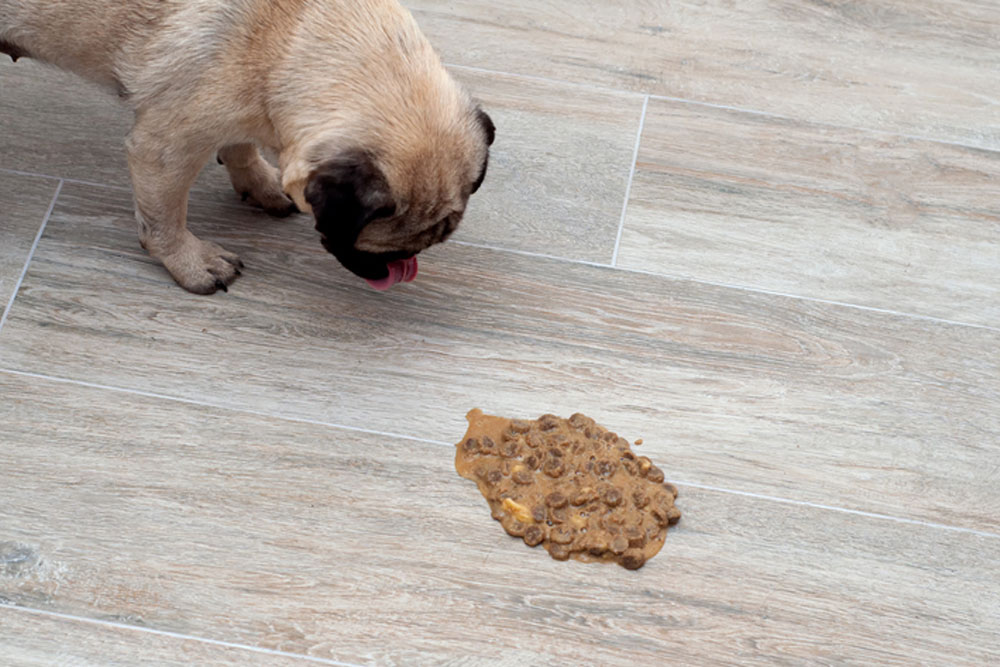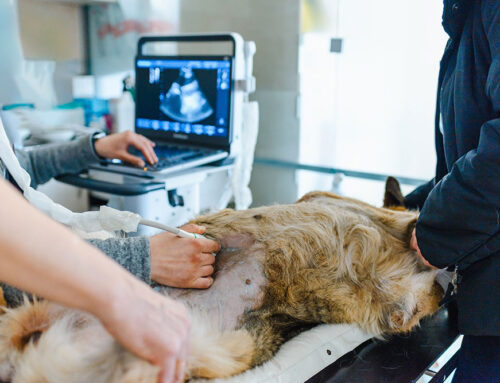Why Dogs Vomit: What Owners Should Know and Do Next
You notice your dog pacing, licking their lips, and making that telltale heaving motion- and suddenly, there’s vomit on the floor. It’s a moment every dog owner knows too well, and it always brings the same question: should I worry?
Sometimes vomiting is a simple response to eating too fast or snacking on something questionable. Other times, it’s a warning sign of a deeper issue like toxins, pancreatitis, or intestinal blockage.
At Cobb & Co. Veterinary Clinic in Elgin, IL, we help you tell the difference. With same-day urgent care and a calm, low-stress environment, our team can quickly identify the cause and guide you through the best next steps.
Understanding Why Dogs Vomit
Vomiting is not a disease- it’s a symptom of many possible conditions. It’s also important to distinguish vomiting from regurgitation:
- Regurgitation is a passive event that happens soon after eating, bringing up undigested food without much effort. This can occur in conditions like megaesophagus.
- True vomiting involves visible effort- heaving, abdominal contractions, and partially digested material.
Recognizing which is occurring helps your veterinarian pinpoint the cause more quickly.
The Many Causes of Vomiting in Dogs
Because vomiting can arise from so many sources, veterinarians often categorize it by short-term triggers versus chronic or systemic causes. Understanding these differences helps you decide when to worry and when simple monitoring is enough.
1. Dietary Indiscretion and Digestive Upset
For most dogs, the occasional upset stomach starts with curiosity. Dogs evolved as scavengers, meaning it’s instinct for them to snag that old piece of pizza out of the trash or the rotting, undistinguishable snack off the curb on your walk. Just because it’s normal behavior does not mean it’s nothing to worry about. Even abrupt food changes can upset the gut’s balance.
Following pet food safety guidelines can prevent many of these issues, but even the best-fed dogs make questionable choices.
Signs of simple dietary indiscretion often include mild vomiting, occasional diarrhea, and temporary loss of appetite. If your dog seems otherwise bright and recovers within a day, it may pass without major concern. However, persistent vomiting or signs like blood in the vomit, abdominal discomfort, or lethargy require veterinary attention.
2. Toxin Exposure
Unfortunately, not every “snack” is harmless. Household toxins, medications, and certain foods can cause sudden and severe vomiting. Chocolate, xylitol (found in sugar-free gum and peanut butter), grapes, onions, and even some houseplants can cause serious illness.
If you suspect poisoning, call ASPCA Poison Control immediately while preparing to seek veterinary care- some toxins act within minutes or hours.
Other common toxin sources include antifreeze, rodenticides, and garden chemicals. Vomiting may be accompanied by tremors, drooling, or collapse- clear emergencies that need prompt treatment.
3. Gastrointestinal Obstructions
One of the most serious- and sadly common- causes of vomiting in dogs is an intestinal blockage. Dogs that swallow toys, rocks, bones, or fabric can develop dangerous obstructions that block digestion and trap gas.
Foreign body obstructions cause persistent vomiting, abdominal pain, and refusal to eat. Once the stomach is empty, dogs may vomit foam or yellow bile.
Because obstructions can quickly lead to intestinal rupture or sepsis, immediate veterinary intervention is critical. X-rays, ultrasound, or endoscopy are often needed to locate and remove the blockage safely.
4. Infections and Inflammatory Disease
Infectious causes- such as bacterial gastroenteritis, parasites, or viral diseases- can all trigger vomiting. Canine parvovirus is particularly severe, especially in puppies, causing violent vomiting, bloody diarrhea, and dehydration.
Other causes like Giardia or intestinal worms are more common but still require prompt diagnosis and treatment.
Inflammatory bowel disease (IBD) and food sensitivities can also cause chronic vomiting, sometimes mistaken for simple “sensitive stomach.” These often need prescription diets or long-term medication to control inflammation.
5. Pancreatitis
Pancreatitis occurs when the pancreas becomes inflamed, often after eating fatty food or table scraps. It can cause persistent vomiting, abdominal pain, dehydration, and loss of appetite.
This condition can be life-threatening if untreated, requiring hospitalization, fluids, and careful dietary management. Preventing pancreatitis often comes down to keeping human food, grease, and fatty treats off the menu.
6. Chronic and Metabolic Diseases
When vomiting happens repeatedly over weeks or months, it’s often linked to organ dysfunction.
- Chronic kidney disease leads to toxin buildup that causes nausea and poor appetite.
- Liver disease interferes with digestion and detoxification, leading to vomiting, jaundice, and fatigue.
- Endocrine disorders like Addison’s or diabetes may cause cyclical vomiting due to hormonal imbalance.
Routine bloodwork during wellness visits helps identify these problems early, often before symptoms become obvious.
7. Bilious Vomiting Syndrome
Some dogs vomit yellow bile, usually early in the morning or after skipping meals. This bilious vomiting syndrome is caused by stomach acid irritating an empty stomach.
Small, frequent meals- or a bedtime snack- often resolve symptoms, though similar signs can indicate other diseases, so veterinary confirmation is still important.
When Vomiting Signals an Emergency
A single mild episode isn’t cause for panic- but certain patterns or symptoms demand urgent care.
Seek veterinary attention right away if you notice:
- Vomiting that occurs multiple times in a few hours
- Blood or “coffee ground” appearance in vomit
- Attempts to vomit without producing anything (possible bloat/GDV– this is a critical emergency!)
- Swollen abdomen or visible pain
- Weakness, shaking, or pale gums
- Loss of appetite combined with vomiting
At Cobb & Co., our urgent care services and same-day sick pet visits ensure your dog gets fast, expert attention before complications arise.
Home Care and Prevention
For mild, one-time vomiting episodes:
- Withhold food for 12–24 hours (unless your dog is a puppy or diabetic).
- Offer small sips of water or ice chips to maintain hydration.
- Once vomiting stops, introduce a bland diet- boiled chicken and rice or a prescription GI food.
Monitor closely for return of symptoms or other changes in behavior. Keep a record of vomiting episodes, diet, and possible triggers- your vet can use this to narrow down causes.
To reduce future episodes:
- Stick to consistent, high-quality diets.
- Avoid feeding fatty scraps, bones, or rich treats.
- Prevent access to garbage or unknown objects.
- Maintain parasite prevention and vaccination schedules.
- Schedule annual wellness exams and lab testing for early detection of disease.
Puzzle feeders or slow-feed bowls can also help prevent vomiting in dogs that eat too quickly.

FAQs About Dog Vomiting
Is occasional vomiting normal?
It can happen occasionally, especially if your dog eats grass or something unusual. However, frequent or severe vomiting always indicates an underlying issue that requires veterinary attention.
Can I give my dog over-the-counter medication?
No. Many human antacids and pain relievers are toxic to dogs. Always call your veterinarian before giving any medication or home remedy.
Get Help for Your Dog’s Digestive Health
At Cobb & Co. Veterinary Clinic, we take the guesswork out of your pet’s digestive concerns. Our experienced veterinary team uses advanced diagnostics to uncover the root cause of vomiting- whether it’s mild indigestion or a serious medical condition.
Call (847) 565-1056 or schedule an appointment online. Our compassionate team is ready to help your dog feel better- fast.






Leave A Comment